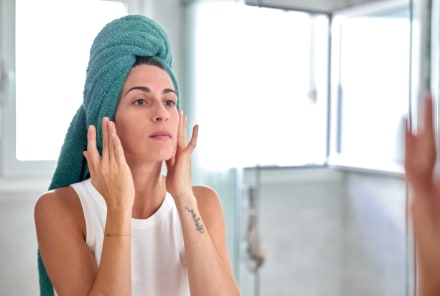Advertisement
New Research Explores The Reason Behind "Leathery" Skin (+ What To Do About It)


If there's one thing the beauty industry knows to be true, it's that collagen plays an important role in the aging process. But when we talk about how collagen impacts the skin, it usually comes down to collagen loss rather than collagen structure. And of course age-related collagen loss is real. Starting at some point in early adulthood, folks start losing collagen at a rate of about 1% per year, and this leads to sagging, fine lines, and deep-set wrinkles.
But that's not the only way collagen might affect the aging process according to researchers. A recent study published in the Journal of the Mechanical Behavior of Biomedical Materials1 looked into how collagen structure impacts skin's appearance, notably when skin starts to appear "leathery."
What is leathery skin & what does collagen have to do with it?
There are many ways the skin changes in appearance, from sagging and sallowness to dark spots and wrinkles. When we talk about skin appearing "leathery" we're specifically referring to the texture, which will look thicker, tougher, and worn.
In most circumstances, this descriptor is used to describe skin that's spent a bit too much time out in the sun. And that's not a coincidence.
The recent study from Binghamton University delved into what was happening at a biological level with leathery skin. And they found that ultraviolet radiation not only deteriorates collagen but alters the epidermis and stratum corneum microstructure.
As the researchers exposed skin to more and more UV radiation, they found that the collagen became tightly packed and less malleable. Binghamton University assistant professor of biomedical engineering Tracy Hookway, Ph.D., noted that what they observed was essentially a prolonged wound response. The accumulated UV damage triggers the skin to essentially create scar tissue.
"Our body has this natural response in any tissue when there's some sort of injury, which likely happens in the stratum corneum," she said. "First, wherever there's some sort of weakening, there has to be compensation by some other part of the tissue or else there'll be catastrophic failure. Same thing happens in the heart when you have a myocardial infarction—you build up a scar and your heart's going to not work the same way anymore."
Imagine scar tissue in the more traditional sense: It's more rigid and stiff compared to the flexible, supple skin that surrounds it. So leathery skin, is in a sense, the skin's reaction to chronic sun damage over a large surface area.
How to support collagen and skin health
Sun damage does a number on the skin. There's a reason derms, beauty editors, and researchers alike constantly talk about how important smart sun care is.
"We don't want to put a fear factor in here saying 'don't go out in the sun, but extended periods of time under UV light can toughen up your skin as well as lead to a higher risk of carcinogenic problems," says said Binghamton University associate professor of biomedical engineering Guy German, Ph.D.
The first thing is to wear sunscreen every day. SPF is the No. 1 healthy aging product available and can help protect your skin from damage, skin disease, and yes, aesthetic changes like "leathery skin."
If possible, also be mindful of how you spend time in the sun: Avoid long stretches of time outdoors during peak hours (depending on where you are, this can range from 10 a.m. to 4 p.m.), use smart accessories like hats and sunglasses, and find shade whenever available.
You can also encourage healthy collagen production with a wide variety of skin care steps. As for topical interventions, retinol and vitamin C serums can improve the appearance of the skin. Internally, be sure to eat a diet full of collagen-supporting nutrients and even consider supplementation.
The takeaway
Caring for your skin is often considered vanity—but as research shows time and again, ignoring environmental stressors can be detrimental to your health. "Any kind of disruption to the normal process of skin is going to be extremely dangerous and detrimental to our overall lifestyle," says Abraham Ittycheri, a biomedical engineering Ph.D. student who worked on the study. "That's not even going into the cosmetic side of things, where a person's perception about themselves can be challenged when their skin does not look good."
Watch Next
Enjoy some of our favorite clips from classes
Enjoy some of our favorite clips from classes
What Is Meditation?
Mindfulness/Spirituality | Light Watkins
Box Breathing
Mindfulness/Spirituality | Gwen Dittmar
What Breathwork Can Address
Mindfulness/Spirituality | Gwen Dittmar
The 8 Limbs of Yoga - What is Asana?
Yoga | Caley Alyssa
Two Standing Postures to Open Up Tight Hips
Yoga | Caley Alyssa
How Plants Can Optimize Athletic Performance
Nutrition | Rich Roll
What to Eat Before a Workout
Nutrition | Rich Roll
How Ayurveda Helps Us Navigate Modern Life
Nutrition | Sahara Rose
Messages About Love & Relationships
Love & Relationships | Esther Perel
Love Languages
Love & Relationships | Esther Perel


















